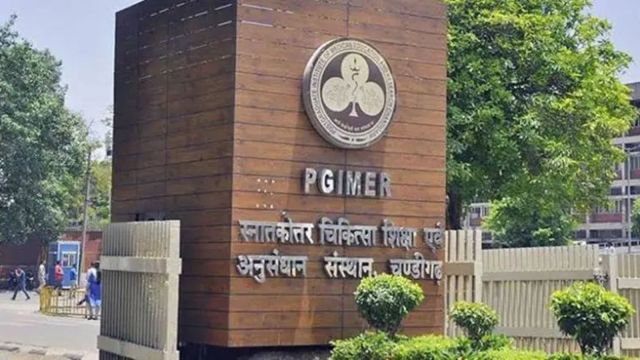PGI’s new software feature to send auto alerts for cadaver kidney transplant patients
Officials said the system, first rolled out last year to digitise patient data. The latest addition will now ensure that patients do not miss their follow-ups, a critical aspect in cases where the waiting time stretches into years.
 The PGIMER’s overall kidney transplant programme has seen a significant improvement in recent years. (File Photo)
The PGIMER’s overall kidney transplant programme has seen a significant improvement in recent years. (File Photo)In a major step towards easing the burden on kidney transplant patients, the Postgraduate Institute of Medical Education and Research (PGIMER), Chandigarh, has introduced a new feature in its digital waiting list management system. The upgrade will automatically send text alerts to patients registered under the cadaver (brain-dead donor) kidney transplant programme, reminding them of their follow-up visits.
Officials said the system, first rolled out last year to digitise patient data, had already streamlined the management of both live and cadaver transplant recipients. The latest addition will now ensure that patients do not miss their follow-ups, a critical aspect in cases where the waiting time stretches into years. At present, the cadaver kidney transplant waiting list at the PGIMER is nearly 8,800 patients. Unlike live donation programmes, where a patient brings a donor and the transplant is completed within two to three months, cadaver transplants depend entirely on the availability of organs from brain-dead patients. Matching remains another hurdle, leading to long and uncertain waits.
During this period, patients are required to visit the PGIMER every three to four months to continue dialysis and receive prescribed medication. “Reaching out to every single patient in such a large pool will be made easier with this new feature. It will bridge a gap by automatically alerting patients as their follow-up date approaches,” Prof H S Kohli, Head of the Department, Nephrology, PGIMER, said.
He added that many patients drop out midway, either because they undergo transplants elsewhere, abandon treatment due to financial or logistical constraints, or, in some cases, do not survive the waiting period. “Through the software, we want to make sure patients stay connected to their treatment cycles. Dialysis allows many to live normal lives. Missing follow-ups, however, increases the risk of complications,” Kohli stressed.
Until last year, the PGIMER transplant coordinators managed waiting lists manually, a cumbersome process that often led to delays. With the development of its in-house software, the institute now stores complete records of both live and cadaver transplant patients, ranging from registration details to hospital visits. “The system has been a game changer. By introducing the auto-alert feature, the institute has taken the next logical step in ensuring timely patient compliance,” an official from the engineering division overseeing the IT platform, said.
Interestingly, the PGIMER’s overall kidney transplant programme has seen a significant improvement in recent years. With the Urology Department receiving a licence for transplantation alongside the existing Renal Transplant Surgery unit, the institute has doubled its capacity.
Previously, the waiting time for a transplant stretched from 12 to 16 months. Now, in many cases, the wait has come down to just three months. Last year alone, the PGIMER performed more than 350 kidney transplants, a record for the institute that had rarely crossed 200 transplants annually in the past.
“This is the first time we have been able to handle such high volumes. With a dedicated OT for the Renal unit and routine multipurpose OTs for live donor surgeries, our efficiency has gone up. Separate transplant groups and streamlined processes have further reduced delays,” Dr Raja Ramachandran, assistant professor, Department of Nephrology, PGIMER, Chandigarh, explained.
A large number of the PGI’s kidney transplant patients come from outside Punjab and Chandigarh. Officials said that nearly half of the recipients are from Bihar, Jharkhand, and Uttar Pradesh. The cost of a transplant at PGI is around Rs 2 lakh, but most patients are supported under government schemes, including Chief Minister’s relief funds. While the release of funds can sometimes take up to two months, doctors said it usually does not cause significant delays.
Still, health challenges often complicate waiting. “In many cases, patients develop infections or other illnesses, which make them temporarily unfit for surgery. Only when they recover can the transplant proceed. On the other hand, healthier patients get cleared much faster,” Ramachandran added.
The PGIMER is among India’s leading centres for renal transplantation. It conducted its first kidney transplant in 1973 and has since become a nodal regional centre under the National Organ and Tissue Transplant Organisation (NOTTO). As a Regional Organ and Tissue Transplant Organisation (ROTTO), it coordinates with neighbouring states to raise awareness and facilitate organ donation. Over the years, the institute has steadily expanded its transplant programme, but the introduction of new technology marks a decisive shift. The digital waiting list, officials said, has already improved transparency and efficiency. The auto-alert feature now adds a critical layer of patient safety. “Ultimately, our goal is to ensure that no patient loses out on treatment simply because of a missed visit. Technology will help us do just that,” Kohli said.
Lack of symptoms is a reason why kidney diseases often remain undetected in the early stages, with doctors recommending a healthy lifestyle to prevent obesity, hypertension, diabetes, which contribute to the high occurrence of kidney diseases.







